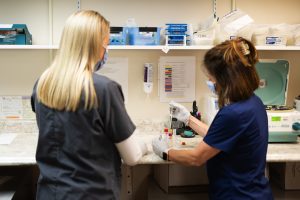
Roger DeRaad joined Monument Health in 1989 as a Flight Nurse and Intensive Care Unit caregiver. He left for a brief period to pursue graduate school, but came back with a deeper awareness of the importance of clinical research.
He joined Rapid City’s Heart Doctors in 1994 (which was purchased by Regional Health in 2010), and has been serving as Director of Research for Monument Health since 1996. His team of 17 has approximately 50 active clinical research trials at any given time. Recently, because of their solid reputation and experience, the team has been asked to participate in several studies related to COVID-19 treatments.
“Our team is very aware that the work we do is important, and we’re really proud of that,” Roger said. “We know that what we do here for our community and for our patients ultimately affects millions of people.”

Clinical Research Coordinators Susan McLaughlin (right) and Melissa Slettedahl (left) at the MonumentHealth Clinical Research building in Rapid City.
This week the team began enrolling patients in the COVID-PACT study, a randomized-controlled trial that will evaluate the safety and efficacy of “antithrombotic therapy” for COVID-19 patients who develop arterial and venous thrombotic complications. They’re also involved in a Mayo Clinic project to determine the effectiveness of plasma from recovered COVID-19 patients as a treatment for current patients. Negotiations for trials involving COVID-19 antibody therapy and vaccine therapies are also underway.
“Practitioners working with COVID-19 patients are very interested in trials that will help them respond to everything they’re dealing with, because right now we just don’t know a lot about how to best care for these people,” he said. “A randomized trial is a good indication that we’re moving toward an answer.”
COVID-19 aside, Monument Health Clinical Research has always been on the cutting edge of medicine. Clinical research trials give Monument Health patients access to new therapies, but they also benefit the providers who get a chance to work with new medications and devices before they’re more widely available. Right now more than 500 patients are active in clinical research at Monument Health.
“When a new medication is approved, we may have already been working with it for a while, so our physicians have experience with it,” Roger said. “The same with certain cardiac devices; many people might not know that as patients in our community they have access to some of the latest devices.”
Patients can get involved in a research project through their provider knowing about a current study they would be eligible for, but the research team also screens Monument Health patients multiple times a day to examine whether someone is eligible for and could possibly benefit from an active trial. Other team members include those who monitor patients throughout the trial, laboratory staff who keep an inventory of medications and devices, regulatory caregivers, and a quality group that enters and analyzes data.
In addition to taking on new COVID-related research projects, the team had to quickly respond to the pandemic earlier this year by transitioning their patients to remote appointments. Kelli McIntosh, Manager of Research, said the group had to get creative in terms of maintaining their current studies.
“We had to move quickly and communicate with our patients of our plans moving forward,” she said. “Even if they weren’t due for an appointment right away, we were in close contact with them, and they really appreciated that consideration.”
Roger said many patients participate in clinical research because it gives them an opportunity to fight back. “Whenever we get a new diagnosis, we want to fight back, and research provides a way to do that,” he said.
COVID-19 has presented Roger’s group with a big opportunity to fight back against COVID-19. “Humankind is fighting this crisis right now, and it feels good to be involved in this work and contribute to that,” he said.